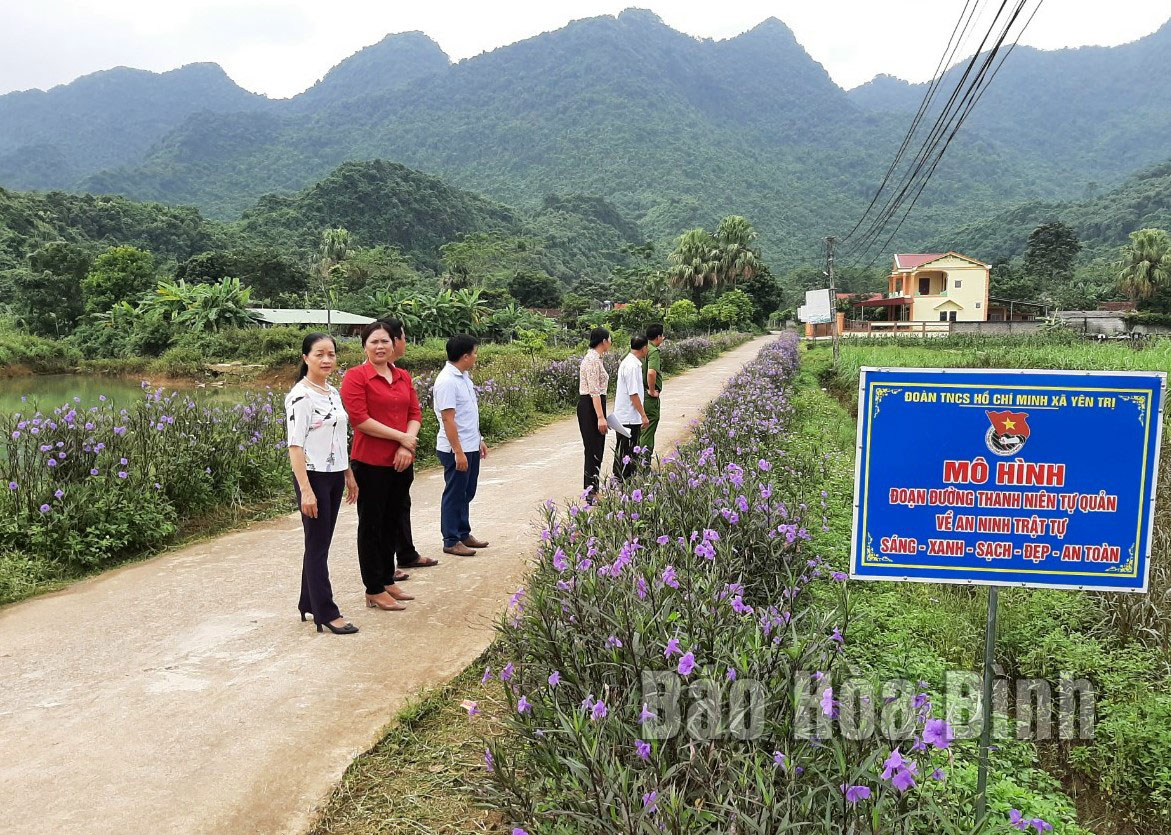
(HBO) – In this year's rainy season, the travel by residents in Lac Luong commune is much more convenient. There are no longer muddy roads, as they have been asphalted and concreted. In late March, villagers were delighted and proud to receive a certificate recognising the commune as meeting new-style rural standards. Earlier, other particularly difficult rural areas of Yen Thuy district such as Huu Loi and Bao Hieu were also recognised as fulfilling new-style rural building criteria. By now, three out of the five extremely difficult communes in the district have completed this work.

New-style rural
building has contributed to creating a green, clean and beautiful landscape for
Yen Tri commune (Yen Thuy).
Implementing the National Target Programme on New-style
Rural Area Building, Yen Thuy district has invested resources in upgrading its
roads. To date, 100% of the district, communal and inter-commune roads have
been asphalted and concreted; and 89% of the main roads of villages and hamlets
and 71% of their alleys concreted and cemented.
Along with infrastructure, social welfare activities in the
district have received due attention. The work of building communes in
accordance with the national standards on health has been implemented
effectively. Currently, the whole district has all the 11 communes and township
that meet the national standards of health, with the rate of people
participating in health insurance reaching 95%. Regarding the building of
cultural life, the percentage of families of culture accounts for 88%, and that
of cultural residential areas, about 96%. At present, 31 out of the 38 schools,
equal to 81.57%, have been recognised as meeting national standards. The
district is striving to raise the proportion to 89.47% by the end of 2023.
Bui Huyen, Vice Chairman of the Yen Thuy district People's
Committee, said that the national target programme on new-style rural area
building for the 2021-2025 period has received attention by the Party
committees at all levels, and the active participation of people and the
society. The material and spiritual life of people has been raised. To date,
eight out of the district’s 10 communes have been recognised as meeting
new-style rural building standards, and one as a model new-style rural area.
The effectiveness of the programme has made an important contribution to
promoting the local socio-economic development, building and embellishing
infrastructure, and especially improving the quality of life of local people.
According to data from the Hoa Binh Provincial Party Committee, the industrial production index for the first six months of 2025 is estimated to have increased by 20% compared to the same period last year. This marks the highest year-on-year growth rate for this period since 2020.
In the first six months of 2025, Hoa Binh province’s export turnover was estimated at 1.145 billion USD, marking an 18.11% increase compared to the same period in 2024. Import turnover was estimated at $ 804 million, a 17.15% increase, which helped the province maintain a positive trade balance.
The lives of the ethnic minority farmers in Tan Lac district have gradually improved thanks to the new directions in agricultural production. This is a testament to the collective strength fostered through the professional associations and groups implemented by various levels of the district’s Farmers’ Union.
With the motto the "product quality comes first,” after nearly one year of establishment and operation, Muong village’s Clean Food Agricultural and Commercial Cooperative, located in Cau Hamlet, Hung Son Commune (Kim Boi district), has launched reputable, high-quality agricultural products to the market that are well-received by consumers. The products such as Muong village’s pork sausage, salt-cured chicken, and salt-cured pork hocks have gradually carved out a place in the market and they are on the path to obtaining the OCOP certification.
In the past, the phrase "bumper harvest, rock-bottom prices" was a familiar refrain for Vietnamese farmers engaged in fragmented, small-scale agriculture. But today, a new spirit is emerging across rural areas of Hoa Binh province - one of collaboration, organisation, and collective economic models that provide a stable foundation for production.
Maintaining growing area codes and packing facility codes in accordance with regulations is a mandatory requirement for agricultural products to be eligible for export. Recently, the Department of Agriculture and Environment of Hoa Binh province has intensified technical supervision of designated farming areas and packing facilities to safeguard the "green passport" that enables its products to access international markets.



